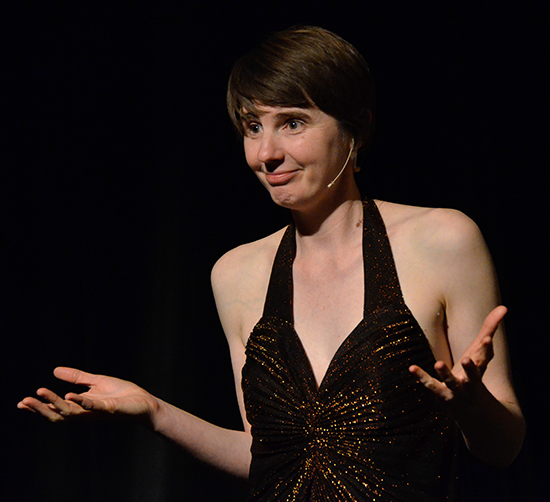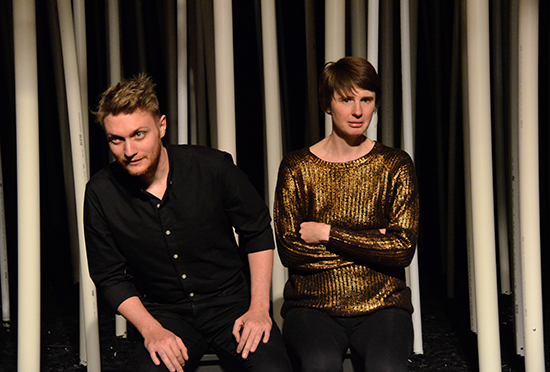Everyday crisis-resilience
Ben Brooker: Emma Beech, Life is Short and Long

Emma Beech, Life is Short and Long
We live in a time of crisis: economic, environmental, humanitarian, political. As the conflict in Syria and the European migrant emergency remind us daily, the victims are more often than not ordinary folk—the children and politically disenfranchised women and men who have to live with the consequences of policy decisions over which they have little or no control. It’s these people who are the focus of Life is Short and Long, the latest and most sophisticated of performance-maker Emma Beech’s long-running series of works built around her theatricalised retelling of conversations with strangers in disparate parts of the world.
Beech’s practice is a sort of performative ethnography, although its signature is not the presentation of systematic data. Rather, it savours the randomness of everyday life, revealing the humanity of its subjects with a lightness of touch.
In her previous I Met… series, made in collaboration with the Adelaide-based Australian Bureau of Worthiness (see RealTime 115 and 119), Beech turned her attention to cities as distinct as Adelaide, Geelong and Viborg (Denmark), asking strangers, “What makes your day worth it?” In this new iteration, it’s the theme of crisis that informed Beech’s conversations with the residents of Barcelona, Port Adelaide and the precariously small mid-north South Australian town of Wirrabara. Though far apart and culturally dissimilar, each of these communities is facing some kind of upheaval. In Barcelona, the effects of 2008’s catastrophic market collapse are still being felt; in Wirrabara, the effects of major bushfires in the Bangor Forest in 2014 remain disfiguring and traumatising; and in Port Adelaide, where the work’s premiere showing took place, the struggle for rejuvenation after the collapse of once-thriving local industry goes on.
Each of these crises is seen through the eyes of various interview subjects whom Beech gently mimics in tone and gesture but never completely disappears into. There’s Jim, rendered with blokey insouciance, a Port Adelaide hairdresser whose descent from well-to-do salon-owner in the 1960s to destitute alcoholic a decade or so later mirrors the depressed fate of the suburb itself. And then there’s Marga, a Catalan performance-maker, whom Beech brings to vivid, acutely observed life with pitch-perfect accent and an almost balletic grace that—despite Marga’s financial hardship and her agonising over the prospect of bringing a child into the world—seems to seep into everything, even her chain-smoking. According to Beech, it was her friendship with Marga that, more than anything else, inspired the work’s creation. Her quiet dignity—as well as her barely contained rage at the forces responsible for the GFC, and the tourists who now flock to her country to exploit its low cost of living—sits at the core of the work.

Tim Overton, Emma Beech, Life is Short and Long
Beech herself features in the narrative, as does her partner, comedian and performance-maker Steve Sheehan, especially in the Wirrabara segments. For example, they come third in the pumpkin competition held on the town’s market day by raiding their holiday accommodation’s vegetable garden. Another thread involves Beech’s pregnancy with triplets, which in itself develops into a crisis as her body is placed under enormous strain—at one point during her long hospital stay she is told by medical staff that her cervix is ‘melting’—and the babies are born prematurely and underweight.
The installation-like design, conceived by Meg Wilson and realised by Michelle Maddog Delaney, consists of a forest of variously sized PVC pipes, each rising to a different height out of a floor of blackened bark chips that evoke the Wirrabara bushfires. The audience is required to walk through this in groups of four to reach the performance space, an intimate, wood-floored rectangle with seating on three sides and overhung with long strings of multicoloured party lights. The eerily lit forest forms a slightly surreal backdrop and becomes both a sanctuary and a place of frightening isolation at different points in the performance.
Beech uses little in the way of props or set dressing to differentiate between places and people. A bench is occasionally brought on by co-performer and assistant stage manager Tim Overton (who also, somewhat unnecessarily, reels off various facts and figures about each of the work’s geographic locations) and a red flower Beech wears in her hair identifies Marga, but clarity is ensured by Beech’s virtuosic shifts of character. All of these elements cohere elegantly, with the exception of a puzzling series of short scenes in which Beech seems to be in a nightclub, drinking and dancing alone—a relic, perhaps, from the development process.
The work is humane and generous, rooted in stories of everyday resilience—in the face of crises of recession and change, of both the body and the world—which Beech dramatises with beguiling understatement. If it testifies to the devastating effects of failure on the part of of our political and economic institutions, it also offers hope in its many small but powerful displays of resistance.
–
Vitalstatistix with Country Arts SA: Life is Short and Long, concept, text, direction, performance Emma Beech, co-direction Tessa Leong, design (concept) Meg Wilson, design (realisation) Michelle Maddog Delaney, sound design Tristan Louth-Robins, co-performer, assistant stage manager Tim Overton; Waterside Workers Hall, Port Adeiaide,11-21 Oct; Wirrabara Town Hall, 28-29 Oct
RealTime issue #135 Oct-Nov 2016






